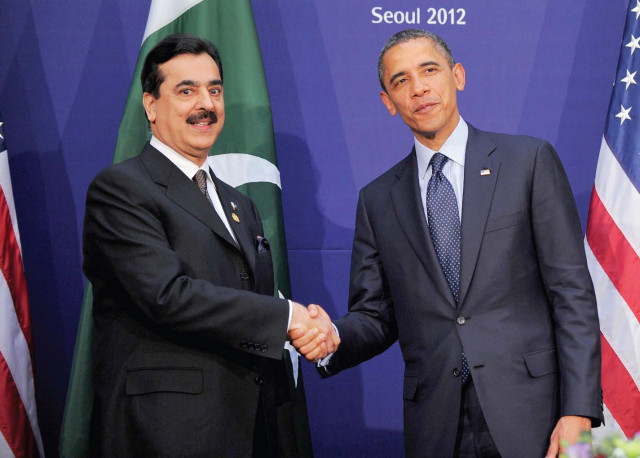Pakistan-US alliance: Obama hopes review will respect US security needs
During meeting US president, PM Gilani vow to rescue anti-terror alliance.

As Pakistan’s Parliament started debating recommendations on how to proceed on ties with the United States, President Barack Obama said he hoped the parliamentary review would be balanced and respect America’s security needs.
After Monday’s informal chat, President Obama and Prime Minister Yousaf Raza Gilani met formally on Tuesday on the sidelines of the nuclear security summit in the South Korean capital.
It was the highest-level contact between the two uneasy allies since US special forces killed al Qaeda kingpin Osama bin Laden in a clandestine raid in Abbottabad last May.
More recently, the killing of two dozen Pakistani troops in a cross-border US air raid had almost ruptured relations following over 10 months of mistrust and recriminations, and prompted Islamabad reconfigure its ties with Washington.
President Obama conceded relations had been strained in recent months. “There have been times – I think we should be candid – over the last several months where those relations have had periods of strains,” Obama told reporters as the meeting opened.
“But I welcome the fact that the Parliament of Pakistan is reviewing, after some extensive study, the nature of this relationship. I think it’s important to get it right. I think it’s important for us to have candid dialogue, to work through these issues.”
Pakistan’s cooperation is considered critical to US efforts to stabilise Afghanistan before most foreign combat troops leave at the end of 2014.
The Obama-Gilani meeting coincided with the opening of a parliamentary debate on a 40-point proposal drafted by a multi-party, bicameral parliamentary panel on the future of Islamabad’s relations with Washington.
Obama said he hoped the parliamentary review would take a “balanced approach that respects Pakistan’s sovereignty, but also respects our concerns with respect to our national security and our needs to battle terrorists who have targeted us in the past”.
Prime Minister Gilani said he was pleased to hear Obama talk about sovereignty. Pakistan says that American CIA’s drone campaign against al Qaeda and its Taliban cohorts in its tribal regions infringes on its sovereignty. Under fresh terms of engagement, Pakistan may also ask the US to call off drone strikes.
It wasn’t clear whether the issue was discussed in Tuesday’s meeting.
Top Obama aide Ben Rhodes parried the question and only said that, on counter-terrorism, the two leaders reviewed how to ensure an ongoing dialogue to improve cooperation. He refused to go into details.
Rhodes, deputy national security adviser, gave an upbeat assessment of the interaction. “This was a meeting that made important progress, with both sides being able to hear directly from one another about what their views are of the various interests on which we have cooperated,” he told journalists after the meeting.
“We are both interested in a stable and secure Afghanistan and a stable and secure region,” Obama said.
Gilani said: “We are committed to fighting against extremism. We want stability in Afghanistan and Pakistan… We want to work together with you,” he told Obama.
There was also no indication whether Obama and Gilani discussed Bin Laden’s killing – an incident seen as a humiliation for Pakistan’s government and armed forces.
The US wants Pakistan to unplug the Nato supply routes it had blocked since the November 2011 Nato raid. However, Pakistan’s Parliament is unlikely to give the go-ahead for the move anytime soon because of differences among the government and opposition.
Published in The Express Tribune, March 28th, 2012.



















COMMENTS
Comments are moderated and generally will be posted if they are on-topic and not abusive.
For more information, please see our Comments FAQ